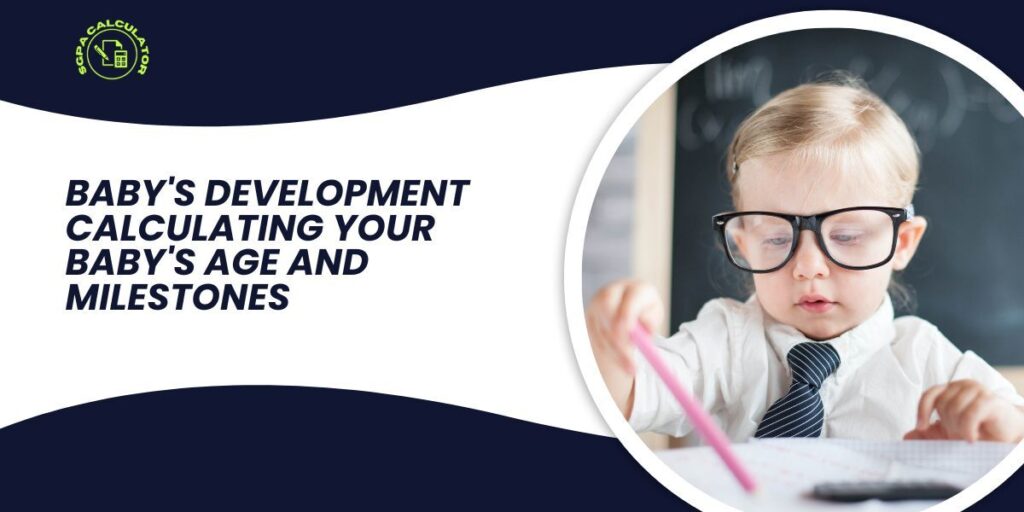Welcoming a new member into the family is a joyous occasion filled with excitement and wonder. As parents, one of the most intriguing aspects of this journey is witnessing the rapid growth and development of your baby. Understanding your baby’s age and corresponding developmental milestones is essential for nurturing their growth and ensuring they reach their full potential. In this comprehensive guide, we’ll delve into how to accurately calculate your baby’s age and explore the milestones they typically achieve during their early years.
Calculating Your Baby’s Age
Gestational Age vs. Chronological Age
Gestational Age
Gestational age refers to the number of weeks your baby has spent developing in the womb. It is calculated from the first day of the mother’s last menstrual period (LMP) to the baby’s date of birth. This method is often used by healthcare professionals, especially during pregnancy and the immediate postnatal period.
Chronological Age
Chronological age, on the other hand, is the actual time elapsed since your baby’s birth. It is what we typically refer to when discussing a baby’s age in months, weeks, or years.
Adjusted Age (for Premature Babies)
Premature babies, born before completing 37 weeks of gestation, may have developmental milestones that differ from full-term babies. Adjusted age, also known as corrected age, is used to account for this difference. It is calculated by subtracting the number of weeks your baby was born early from their chronological age. This adjusted age is often used as a guideline for tracking developmental milestones in preterm infants.
Practical Age Calculation
To calculate your baby’s age, you can use various methods, including:
Months and Days: Count the number of months and days since your baby’s birth. For example, if your baby was born on May 15th, and it’s currently December 20th, they would be 7 months and 5 days old.
Weeks: Counting in weeks is particularly common during the early stages of infancy. Simply multiply the number of weeks by 7 to convert it to days or divide by 4 to estimate the number of months.
Months: For older babies, counting in months provides a clearer picture of their developmental stage. Remember to adjust for partial months if necessary.
Read Our Blog: Exploring the Feline Lifecycle with the Cat Age Calculator
Developmental Milestones
Motor Skills
Gross Motor Skills
Holding Head Up: By around 2 to 4 months, babies can typically hold their heads up while lying on their stomachs.
Rolling Over: Between 4 to 6 months, most babies can roll over from their stomach to their back and vice versa.
Sitting: Around 6 to 8 months, many babies can sit unsupported for short periods.
Crawling: From 6 to 10 months, babies may begin to crawl, although some skip this stage altogether.
Fine Motor Skills
Grasping Objects: Babies develop the ability to grasp objects between 3 to 6 months, progressing from involuntary reflexive grasping to purposeful grabbing.
Pincer Grasp: By 8 to 12 months, babies can use their thumb and forefinger to pick up small objects.
Self-Feeding: Around 9 to 12 months, babies may start to feed themselves with their fingers or attempt to use utensils.
Read Our Blog: Unlocking the Power of Age Adjusted Calculators: A Comprehensive Guide
Cognitive Development
Sensory Awareness
Tracking Objects: By 2 to 3 months, babies can visually track moving objects with their eyes.
Exploring Objects: Around 4 to 6 months, babies begin to explore objects by mouthing and touching them.
b. Problem-Solving:
Object Permanence: Between 8 to 12 months, babies start to understand that objects continue to exist even when they are out of sight.
Language and Communication:
Receptive Language
Responding to Sounds: From birth, babies can startle in response to sudden noises and may turn their heads toward familiar voices.
Read Our Blog: Unlocking the Key to Health: Understanding Metabolic Age Calculators
Expressive Language
Cooing and Babbling: Between 2 to 4 months, babies begin to make cooing sounds and babble, laying the foundation for speech development.
First Words: Typically, babies say their first words around 10 to 12 months, although this can vary widely.
Conclusion
Understanding your baby’s age and developmental milestones is crucial for providing appropriate care and support during their early years. By accurately calculating your baby’s age and tracking their progress against typical developmental milestones, you can ensure they are reaching important stages of growth and address any concerns with your healthcare provider promptly. Every baby develops at their own pace, so remember to celebrate each milestone, big or small, as you witness the incredible journey of your baby’s development.





